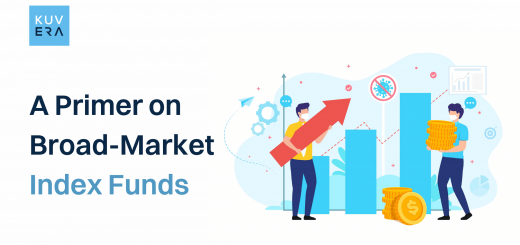Since Vanguard Group, under the leadership of John Bogle, created the first Index Mutual Fund in 1975, index funds have swept the investment world. In developed markets such as the United States, Europe, and Japan, investor commitment to index funds has increased. Since 1993, ETFs have intensified this trend by making index investment easier.
What Is An Index Fund?
Index funds are mutual funds whose portfolios are intended to reflect the market index. These mutual funds have identical returns to the benchmark. These funds feature broad market exposure, a low expense ratio, and a low portfolio turnover rate. These mutual funds imitate the benchmark’s portfolio and are thus also known as passive funds. In addition, these funds are ideal for long-term (10+ years) investors and those who do not wish to regularly check their portfolios.
The Sensex and Nifty indices are representative of the leading companies based on their free-float market capitalisation. Investors desire to profit from both indices, whose constituents are highly regarded and revenue-generating enterprises. Since these indices are not stocks but rather indices, investors must purchase index components with the same weight as the index.
Best Index Funds in India 2022 – Top 10 Index Mutual Funds
| Mutual Fund Scheme | 5-Year Return | AUM (Cr) |
| Nippon India Index S&P BSE Sensex | 13.87% | 324.88 |
| ICICI Prudential S&P BSE Sensex Index Fund | 13.80% | 619.02 |
| HDFC Index S&P BSE Sensex Fund | 13.78% | 3,791.65 |
| Tata S&P BSE Sensex Index Fund | 13.72% | 154.65 |
| LIC MF S&P BSE Sensex Index Fund | 13.46% | 52.02 |
| IDFC Nifty 50 Index | 13.03% | 490.17 |
| Taurus Nifty 50 Index | 12.97% | 1.77 |
| UTI Nifty 50 Index Fund | 12.87% | 8,268.89 |
| Tata Nifty 50 Index Fund | 12.83% | 298.68 |
| HDFC Index Fund Nifty 50 Plan | 12.82% | 6,712.55 |
Source: AMFI (data as of 27/09/2022)
How Do Index Funds Work?
An index defines a market segment. In other words, securities belonging to the same segment are grouped to create an index. These sectors consist either of equity-oriented products, such as stocks, or of bond market instruments. For instance, an index fund that tracks the NIFTY 50 will consist of the same 50 equities in the same proportions. These funds are classified as passively managed since they track a particular benchmark. The fund manager does not select the stocks but rather copies the benchmark. The objective of the fund management team is to preserve the underlying benchmark’s composition.
These funds have returns that are roughly equivalent to the benchmark. However, there would be a tiny variance in performance, which is referred to as a tracking error. The optimal mutual fund would be the one with the lowest tracking error. Additionally, compared to actively managed funds, these funds have a reduced expense ratio. In addition, all future inflows will be invested in the same proportion of the underlying index.
What Are Stock Market Indices?
A stock market index, abbreviated as a stock index, is an indicator that reveals all of the significant fluctuations in India’s stock market. To construct an index, identical stocks are selected from among the already grouped and listed securities on the stock exchange. Nevertheless, the selection criteria are based on the type of industry, the size of the company, and its market capitalization. This indicator is utilised to reduce market confusion and reflect the market’s correct state. The value of an index is affected by changes in the prices of underlying assets.
If prices go upward, the stock index will rise, and if they decrease, the stock index will fall.
Types Of Stock Market Indices
- Benchmark Indices
Nifty 50 – a collection of the top 50 best-performing stocks – and BSE Sensex – a collection of the top 30 best-performing stocks – are respective market indicators for the National Stock Exchange and Bombay Stock Exchange.
This group of stocks is referred to as a benchmark index since it selects companies using the best regulatory processes. Consequently, they are regarded as the best point of reference for markets in general.
- Sector-Specific Indices
Both the BSE and the NSE have excellent indices for measuring companies within a certain sector. Indices such as S&P BSE Healthcare and NSE Pharma are regarded as reliable gauges of changes in the pharmaceutical industry. S&P BSE PSU and Nifty PSU are two further notable examples. Bank Indices are indices of all publicly-traded banks. However, both exchanges are not required to offer sector-specific indices, but this is typically a substantial factor.
- Market capitalization-based indices
Few indices select firms according to their market capitalisation. Capitalisation on the market refers to the market value of every publicly traded company on the stock exchange. In accordance with the criteria established by the Security Exchange Board of India, indices such as S&P BSE and NSE small cap 50 are a grouping of firms having a smaller market capitalization.
- Other Indices
Several additional indices, like the S&P BSE 500, NSE 100, and S&P BSE 100, are significantly larger and have a greater number of stocks listed on them. Investors may have a low appetite for risk, while stocks listed on the Sensex may have a high appetite for risk. Investment portfolios are not customised to each individual’s needs. Therefore, investors must maintain concentration and only invest where they feel secure.
Who Should Invest In Index Funds?
Such funds can serve as a stepping stone for novice investors beginning their investment pursuits.
- Investors who do not like to often monitor fund performance
The primary distinction between actively and passively managed funds is that actively managed funds require constant performance monitoring. However, because index mutual funds are passively managed, their portfolio components and performance are dependent on the particular index.
- Investors with a Low Tolerance for Risk
If you are a risk-averse investor, index funds may be a safer alternative to actively managed funds. If you wish to invest in stocks but are scared of the risks associated with actively managed stocks, you may consider the Nifty Index fund. Such funds will track the market index and generate returns proportional to their performance.
- Low Expense Ratio
Due to the fact that active funds involve human intervention in the form of fund managers, a portion of your investment goes towards the fund manager’s fee. This makes an actively managed fund somewhat more expensive. However, the expense ratio for index mutual funds is far lower because these funds just mimic the index and do not require any manual stock selection.
Types of Index Funds
- Broad Market Index Fund
A Broad Market Index Fund attempts to mimic a significant portion of the investable stock market. For example, an index fund that tracks the NIFTY 500 index is a broad market index fund since it provides investors with exposure to stocks across various market capitalizations and sectors. Motilal Oswal’s NIFTY 500 Fund is one such example. Another example is the Navi Total Market Index Fund, which gives investors exposure to 750 stocks from large-cap, mid-cap, small-cap, and even micro-cap companies.
- Market Capitalization Fund
Size does matter. It is a proverb that is strongly rooted in our society. Especially when it comes to investments. The vast majority of indices are weighted by their market capitalisation. Examples of market-cap weighted indices include the NIFTY 50, the SENSEX, the NIFTY Next 50, the NIFTY Midcap 150, the NIFTY Smallcap 250, and the NIFTY 200.
- Equal Weighted Index Funds
Equal-weight indices can be used to counterbalance the excess and underweighting of market-cap weighted indices. A simple definition of an equal-weight index is an index in which each stock bears the same weight. Take NIFTY 50 as an example of the index under discussion. In this scenario, each of the fifty companies is hypothetically weighted at 2%.
In other words, think of an equal weight index as a perfectly balanced ship that seeks to avoid market momentum and valuation bias-induced storms. Traditionally, an equal weight index places greater emphasis on value. Additionally, an equal weight index is considerably more diverse than a market-weighted index.
- Sector-Based Index Funds
Numerous individuals invest in sector-based ETFs and mutual funds. The plan is to invest in enterprises within the same sector or industry. For instance, there are sector-specific Index Funds and ETFs for the banking, technology, healthcare, infrastructure, and consumer industries, among others. Typically, these sectorial funds serve wider categories. However, there are Index Funds with far more precise objectives. A banking sector Index Fund, for instance, is based on the broader banking category, but investors can also alternatively select a PSU bank only or a private bank only Index Fund.
- Debt Index Fund
Using bond index funds can help you maintain a healthy mix of short, intermediate, and long-term bond maturities that produce steady income. In India, debt-based index funds do not rank among the most popular products. But Debt Index Funds, such as target maturity Index Funds, can be highly effective for lowering your portfolio’s interest rate risk and credit risk.
- International Index Fund
Global/International index funds provide exposure to the world market. As an investor, you can invest in funds that track uncorrelated indices in developing countries and frontier markets.
The recent performance of several indexes, notably US-based indices, has aided in gaining the confidence of Indian investors. This has resulted in a more diversified portfolio, which is a positive effect.
Consider, for instance, the NYSE FANG+ index. This index is comprised of ten widely-traded internet and technology equities (Alibaba, Tesla, Facebook, Twitter, Apple, etc.) with equal weighting.
Advantages Of Index Funds
- Lower Expense Ratio: The expense ratios of index funds are lower than those of actively managed funds. A typical index fund’s expense ratio is between 0.20% and 0.50%, while an actively managed fund’s expense ratio is higher. The smaller the take rate for investors, the higher the expense ratio.
- No Human Error: In an Index Fund, the fund management adheres to the benchmark index, eliminating human discretion in investment decisions. Humans can make errors in judgments. Index, on the other hand, is devoid of human bias, adheres to an automated methodology, and does not require regular surveillance.
- Diversification: Index funds provide diversified exposure to all of the top firms that comprise the index. Diversification enables investors to lessen the risk associated with remaining invested in a single stock or industry, such as auto, pharma, etc.
- Passive Management: In the case of index funds, the allocation of assets is not determined by the fund management; which decreases the likelihood of investors suffering losses owing to the fund manager’s poor decisions. This saves investors time, which they can use to reevaluate their portfolios as necessary.
Index Funds – Things to Consider as an Investor
- Investment Period: Index funds are appropriate for individuals who can remain invested in the fund for an extended period of time. Since these funds mimic a benchmark, they may experience numerous short-term market changes. Long-term, these swings will average out. Therefore, these funds may be a viable solution for long-term asset growth and appreciation.
- Risk profile: Index funds are advised for individuals with a particularly risk-averse profile. As investments are concentrated on index-based funds, the risk associated with them is quite minimal. Moreover, spending a small amount to achieve your goal of portfolio diversification poses no risk. In summary, the proportion of capital allocated to index funds must be proportional to the risk appetite.
- Tracking error: The tracking error represents the difference between the actual performance of the index and the actual performance of the funds. As stated previously, index funds must follow the same path as the market index. Tracking errors will be used to describe any variances in the same. Ensure that the difference between your chosen fund and the benchmark is minimal. Checking the historical tracking inaccuracy of the various index funds on the market could assist you in selecting the most suitable one.
- Financial goal: The completion of your financial goals and objectives should always be the objective of your investment endeavours. Therefore, you must arrange your investments accordingly. Even if you invest blindly in index funds, it may not be sufficient to reach your financial objectives. Therefore, it is essential to ensure that the benefits of index funds do not distract you from your ultimate financial goals.
How To Invest In The Best Index Funds?
If you wish to invest in a mutual fund, you have two options: directly or through an agent. Direct investments can be made either online or offline. If you are working with an investor, you must ensure that they are registered with the Association of Mutual Funds in India (AMFI) and have an AMFI Registration Number.
Investors may also invest directly in index funds without the need for a distributor. For direct plan investments, the investor requires a financial advisor but is not required to pay commissions to distributors. This maximises returns because no commissions are paid.
Investors may also invest directly with the mutual fund by visiting the mutual fund’s branch or by investing online through the mutual fund’s website or websites like kuvera. Forms can be sent to mutual funds via the agents and distributors who offer these services.
Before investing, the investor should consider the performance history of the index fund.
Taxation Of Index Funds
On redemption of index fund units, a capital gain is realised. Depending on how long the units are held, the gains can be either short-term or long-term.
If the units are sold within a year after their allotment, the gain is considered short-term and is taxed at a rate of 15%. In addition, if the units are sold after 1 year of holding, the long-term capital gains realised over Rs. 1,000,000 are taxed at a rate of 10%, with no indexation benefit.
For instance, if there are Rs. 2 lacs long-term capital gain and the investor withdraws this amount after a year of investment, the tax will be paid on Rs. 1 lacs, and the amount payable will be Rs. 10,000.
Conclusion
In the previous few years, index funds have performed at par with actively managed equity funds, if not outperformed them. In addition, these funds are less expensive and have the potential to yield high returns over time. Before investing, you should, among other things, assess your risk tolerance, taxation, fund performance, and overall cost.
FAQ
-
Do Index Funds pay dividends?
Yes, some index funds offer dividend payout plans.
-
What should be the investment horizon for Index Funds?
Investors should have a long-term horizon of at least five years to invest in Index Funds.
Interested in how we think about the markets?
Read more: Zen And The Art Of Investing
Check out all our “Investor Education Originals” videos on Youtube and get smart about investing.
Start investing through a platform that brings goal planning and investing to your fingertips. Visit kuvera.in to discover Direct Plans and Fixed Deposits and start investing today.
#MutualFundSahiHai #KuveraSabseSahiHai #PersonalFinance #InvestorEducation;











